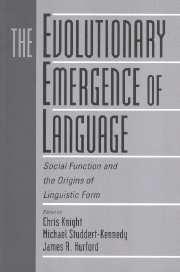Book contents
- Frontmatter
- Contents
- Contributors
- Acknowledgements
- Language: A Darwinian Adaptation?
- Part I The Evolution of Cooperative Communication
- Part II The Emergence of Phonetic Structure
- Part III The Emergence of Syntax
- 13 Introduction: The Emergence of Syntax
- 14 The Spandrels of the Linguistic Genotype
- 15 The Distinction Between Sentences and Noun Phrases: An Impediment to Language Evolution?
- 16 How Protolanguage Became Language
- 17 Holistic Utterances in Protolanguage: The Link from Primates to Humans
- 18 Syntax Without Natural Selection: How Compositionality Emerges from Vocabulary in a Population of Learners
- 19 Social Transmission Favours Linguistic Generalisation
- 20 Words, Memes and Language Evolution
- 21 On the Reconstruction of ‘Proto-World’ Word Order
- Epilogue
- Author Index
- Subject Index
21 - On the Reconstruction of ‘Proto-World’ Word Order
Published online by Cambridge University Press: 24 November 2009
- Frontmatter
- Contents
- Contributors
- Acknowledgements
- Language: A Darwinian Adaptation?
- Part I The Evolution of Cooperative Communication
- Part II The Emergence of Phonetic Structure
- Part III The Emergence of Syntax
- 13 Introduction: The Emergence of Syntax
- 14 The Spandrels of the Linguistic Genotype
- 15 The Distinction Between Sentences and Noun Phrases: An Impediment to Language Evolution?
- 16 How Protolanguage Became Language
- 17 Holistic Utterances in Protolanguage: The Link from Primates to Humans
- 18 Syntax Without Natural Selection: How Compositionality Emerges from Vocabulary in a Population of Learners
- 19 Social Transmission Favours Linguistic Generalisation
- 20 Words, Memes and Language Evolution
- 21 On the Reconstruction of ‘Proto-World’ Word Order
- Epilogue
- Author Index
- Subject Index
Summary
Motivating a ‘Proto-World’ Word Order of SOV
It is a truism that hypotheses about the evolution of cognitive faculties are problematic in ways that those about purely physical features are not. The language faculty, as an evolutionary emergent trait, multiplies such problems by an order of magnitude. As a result, claims about the origins and evolutionary history of this faculty tend to be underlain by a host of assumptions, any or all of which could well turn out to be ill-founded. This chapter is no exception. It takes as a starting point a half dozen or so underlying assumptions drawn from the fields of language typology and language evolution, and ranging from quite well accepted to highly controversial. Its purpose is to argue that if these assumptions are correct, then this conclusion follows:
(1)The earliest human language had rigid SOV (i.e. subject-object-verb) word order.
The first assumption is the following:
(2)SOV order predominates among the world's languages today.
Earlier studies (e.g. Tomlin 1986) posited a roughly equal percentage of SOV and SVO languages. However, Dryer (1989) showed that such conclusions arise from a faulty sampling method. It is true, as Dryer noted, that if one simply counts languages, one does arrive at the conclusion that the two structural types are equally common. But accidents of human history conspire to underplay the predominance of SOV. For example, the great majority of languages in sub-Saharan Africa belong to a single family – the Niger-Kordofanian – and the great majority of these languages are SVO.
Information
- Type
- Chapter
- Information
- The Evolutionary Emergence of LanguageSocial Function and the Origins of Linguistic Form, pp. 372 - 388Publisher: Cambridge University PressPrint publication year: 2000
Accessibility standard: Unknown
Why this information is here
This section outlines the accessibility features of this content - including support for screen readers, full keyboard navigation and high-contrast display options. This may not be relevant for you.Accessibility Information
- 35
- Cited by
